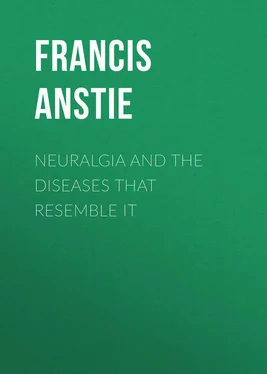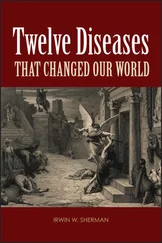Francis Anstie - Neuralgia and the Diseases that Resemble it
Здесь есть возможность читать онлайн «Francis Anstie - Neuralgia and the Diseases that Resemble it» — ознакомительный отрывок электронной книги совершенно бесплатно, а после прочтения отрывка купить полную версию. В некоторых случаях можно слушать аудио, скачать через торрент в формате fb2 и присутствует краткое содержание. Жанр: foreign_antique, foreign_prose, на английском языке. Описание произведения, (предисловие) а так же отзывы посетителей доступны на портале библиотеки ЛибКат.
- Название:Neuralgia and the Diseases that Resemble it
- Автор:
- Жанр:
- Год:неизвестен
- ISBN:нет данных
- Рейтинг книги:5 / 5. Голосов: 1
-
Избранное:Добавить в избранное
- Отзывы:
-
Ваша оценка:
- 100
- 1
- 2
- 3
- 4
- 5
Neuralgia and the Diseases that Resemble it: краткое содержание, описание и аннотация
Предлагаем к чтению аннотацию, описание, краткое содержание или предисловие (зависит от того, что написал сам автор книги «Neuralgia and the Diseases that Resemble it»). Если вы не нашли необходимую информацию о книге — напишите в комментариях, мы постараемся отыскать её.
Neuralgia and the Diseases that Resemble it — читать онлайн ознакомительный отрывок
Ниже представлен текст книги, разбитый по страницам. Система сохранения места последней прочитанной страницы, позволяет с удобством читать онлайн бесплатно книгу «Neuralgia and the Diseases that Resemble it», без необходимости каждый раз заново искать на чём Вы остановились. Поставьте закладку, и сможете в любой момент перейти на страницу, на которой закончили чтение.
Интервал:
Закладка:
4. Neuralgias of Declining Bodily Vigor. – The period here referred to is that which commences with the first indications of general physical decay, of which the earliest which we can recognize (in persons who are not cut off by special diseases) is perhaps the tendency to atheromatous change in the arteries. The first development of this change varies very considerably in date; but whenever it occurs it is a plain warning that a new set of vital conditions has arisen, and especially notable is its connection with the characters of the neuralgic affections which take their rise after its commencement. The period of declining life is pre-eminently the time for severe and intractable neuralgias. Comparatively few patients are ever permanently cured who are first attacked with neuralgia after they have entered upon what may be termed the "degenerative" period of existence. I mentioned the existence of commencing arterial degeneration as the special and most trustworthy sign of the initiation of bodily decay; but it is needless to say that this change is often not to be detected in its earliest stage. Something has been done of late years, however, to render its diagnosis more easy. Not to dwell upon the phenomenon of the arcus senilis, which though of a certain value is confessedly only very partially reliable, we may mention the sphygmographic character of the pulse as possessing a real value in deciding the physiological status of the arterial system. There is a well-known form of pulse-curve, square-headed, with marked lengthening of the first or systolic portion of the wave, and with an almost total absence of dicrotism, even when the circulation is rapid, which will often seem to assure us that atheromatous change of the arterial system has commenced, even when the physical characters of inelastic artery are not to be recognized with the finger in any of the superficial vessels by the touch of the finger. Indeed, the latter test is in all cases far less reliable than the sphygmographic trace, except when the arterial change has proceeded to a very marked degree of development.
To a certain extent, the presence or absence of gray hair is of value in deciding whether physiological degeneration has begun. Like the arcus senilis, however, this is only reliable when joined with other indications, for it may be a purely local and separate change, having nothing to do with the general vital status of the body.
5. Neuralgias which are immediately excited by Anæmia or Mal-nutrition. – Of the neuralgic affections which can be reckoned in this class, the sole characteristic worthy of note is the circumstances in which they arise. It would seem that anæmia and mal-nutrition simply aggravate the tendency of existing weak portions of the nervous system to be affected with pain; just as they notoriously do aggravate lurking tendencies to convulsion and spasm. It is very common, for instance, for women to suffer severely from migraine, and other forms of neuralgia, after a confinement in which they have lost much blood. According to my own experience, however, those patients are generally, if not invariably, found to have previously suffered more or less severe neuralgic pain, at some time or other in their history, in the same nerves which now, under the depressing influence of hæmorrhage, have become neuralgic. One of the very worst cases of clavus which I ever saw happened after hæmorrhage in labor; the pain was so severe and prostrating that it appeared likely the patient would become insane. I discovered, on inquiry, that this woman had been liable for many years to headache affecting precisely the same region, on the occasion of any unusual fatigue or excitement.
There is, however, one variety of neuralgia from mal-nutrition which deserves special consideration, viz., that which is occasionally produced as an after-effect of mercurial salivation. I have only seen one instance of this affection, but several are recorded. [Such, at least, is my impression, but I have not been able to find the reports of them.] My patient was a woman of somewhat advanced years when she first came under my notice, but her malady had (though with long intermissions) existed ever since she was a young girl in service. At that early date she was severely salivated by some energetic but misguided practitioner, for an affection which was called pleurisy, but (according to her description) might well have been only pleurodynia, to which servant girls are so very subject. At any rate, the consequences of the medication were most disastrous. Not only did she then and there lose every tooth in her head and suffer extensive exfoliations from the maxillæ, but after this process was over she began to suffer frightfully from neuralgic pains in both arms and in both legs. Tonic medicines and a change to sea-air brought about a tardy and temporary cure; but from that moment her nervous system never recovered itself. Whenever she took cold, or was over-fatigued, or depressed from any bodily or mental cause, she was certain to experience a recurrence of the pains. At the time of her application to me she was suffering from an attack of more than ordinary severity, and which had lasted a long time without showing any signs of yielding. She apparently could not find words to express the acuteness of her sufferings. All along the course of the sciatic nerve in the thigh, all down the course of the middle cutaneous and long saphenous branches of the anterior crural, in the musculo-spiral, radial, and the course of the ulnar nerves, and also, in a more generalized way, in the gastrocnemii, in the soles of the feet, and in the palms of the hands, the pains were of a tearing character, which she described as resembling "iron teeth" tearing the flesh. The pains recurred many times daily; her life was a perfect burden to her, and always had been during these attacks. This patient was under my observation, on various occasions, during several years, and I established the fact that cod-liver oil always did very great good. But it was evident that nothing would remove the tendency to the recurrence of the pains. I should mention, as additional proof of the extent to which the mercurial poison had shattered the nervous system of this woman, that she had violent muscular tremors at the time of her first attack, and on several subsequent occasions. A more completely ruined life was never seen; the poor woman had been on the highway to promotion in the service of a nobleman when she was mercurialized, but her whole prospects were blighted by the serious danger to her health which was caused by the preposterous antiphlogisticism of her medical attendant.
I do not know that the poisonous action of any other metallic poison than mercury has been distinctly shown to produce neuralgic pains of superficial nerves. The action of lead is well known to produce colic, a disease which will be specially dwelt on elsewhere. And undoubtedly a certain amount of aching pain sometimes attends certain stages of lead-palsy of the extensor muscles of the forearm. But I know of no facts pointing to a true saturnine neuralgia. And the chronic poisonous effects of arsenic on the nervous system seem to produce sensory paralysis, rather than pain.
We come now to the consideration of the local varieties of neuralgia. The primary subdivision of them may be made as follows:
I. Superficial Neuralgias. II. Visceral Neuralgias.
I. Superficial Neuralgias.
Of superficial neuralgias a further classification may be made:
( a ) Neuralgia of the fifth (trigeminal, or trifacial).
( b ) Cervico-occipital neuralgia.
( c ) Cervico-brachial neuralgia.
( d ) Intercostal neuralgia.
( e ) Lumbo-abdominal neuralgia.
( f ) Crural neuralgia.
( g ) Sciatic neuralgia.
This arrangement is that of Valleix, and appears to me substantially correct.
Читать дальшеИнтервал:
Закладка:
Похожие книги на «Neuralgia and the Diseases that Resemble it»
Представляем Вашему вниманию похожие книги на «Neuralgia and the Diseases that Resemble it» списком для выбора. Мы отобрали схожую по названию и смыслу литературу в надежде предоставить читателям больше вариантов отыскать новые, интересные, ещё непрочитанные произведения.
Обсуждение, отзывы о книге «Neuralgia and the Diseases that Resemble it» и просто собственные мнения читателей. Оставьте ваши комментарии, напишите, что Вы думаете о произведении, его смысле или главных героях. Укажите что конкретно понравилось, а что нет, и почему Вы так считаете.












